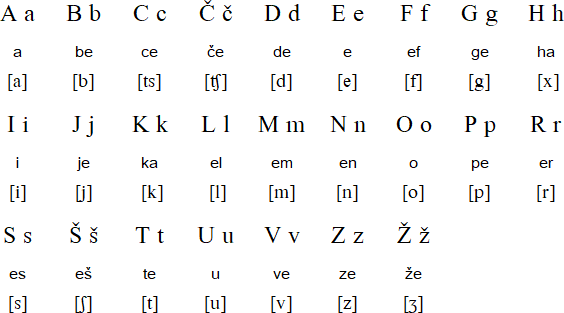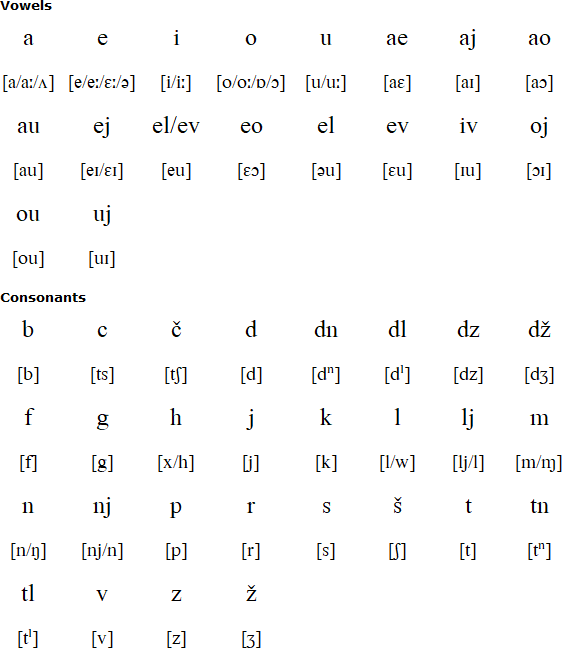Slovenian or Slovene is a South Slavic language spoken by about 2.5 million people mainly in Slovenia, and also in Italy, particularly in Friuli Venezia Giulia; in Austria especially in Carinthia and Styria; in Vas in Hungary, and and also in Croatia.
Slovenian is closely related to Croatian and Serbian, particularly to the Kajkavian and Čakavian dialects, and is in fact more or less mutually intelligible with Kajkavian Croatian dialects.
There is a standardised variety Slovenian used in speech and writing which developed from central dialects from the 18th century, and there are also distinct regional varieties some of which differ from the standard language considerably in phonology, vocabulary and grammar. In recent years use of the regional varieties has declined and while they retain their distinct pronunciation, other aspects have become increasingly like the standard language. Slovenian dialects spoken in the Italian province of Udine have not been influenced by standard Slovenian and can be difficult for other Slovenian speakers to understand.
The earliest known examples of a distinct, written form of Slovenian appear in the Freising Manuscripts, (Brižinski spomeniki in Slovenian), which date from around 1,000 AD. The first publised works in Slovenian, a catechism and an alphabet primer appeared in 1551, and the first Slovenian translation of the Bible was published in 1584. In 1811 Slovenian was adopted as the language of education, administration and the media and later became the official language of Slovenia.

Hear the Slovenian alphabet

Download an alphabet chart for Slovenian (Excel)
More details of Slovenian phonology (PDF, 128K) and pronunciation (PDF, 259K)
Notes on Slovenian pronunciation provided by Ivan Valencic with corrections and additions by Jan Zajec.
Vsi ljudje se rodijo svobodni in imajo enako dostojanstvo in enake pravice. Obdarjeni so z razumom in vestjo in bi morali ravnati drug z drugim kakor bratje.
All human beings are born free and equal in dignity and rights. They
are endowed with reason and conscience and should act towards one another
in a spirit of brotherhood.
(Article 1 of the Universal Declaration of Human Rights)
Information about Slovenian | Phrases | Tower of Babel | Books about Slovenian on: Amazon.com and Amazon.co.uk [affilate links]
Information about Slovenian
http://en.wikipedia.org/wiki/Slovene_language
http://www.thezaurus.com/?/language/slovenian_language_the_introduction/
Online Slovenian lessons
http://www.e-slovenscina.si/login_snd_eng.asp
http://www.101languages.net/slovenian/
http://www.youtube.com/user/learnslovene
http://polymath.org/slovene.php
Slovenian phrases
http://www.bbc.co.uk/languages/other/quickfix/slovene.shtml
http://www.ijs.si/lit/slovene.html
http://www.101languages.net/slovenian/basics.html
Slovenian dictionaries
http://bos.zrc-sazu.si/sskj_en.html
http://www.4ezi.com/ezisoftware/projects/slovar/
http://www.lexilogos.com/english/slovenian_dictionary.htm
BBC World Service in Slovenian
http://www.bbc.co.uk/slovene
Belarusian, Bosnian, Bulgarian, Croatian, Czech, Goral, Kashubian, Knaanic, Macedonian, Montenegrin, Old Church Slavonic, Polish, Russian, Rusyn, Serbian, Silesian, Slovak, Slovenian, Sorbian, Ukrainian, West Polesian
Languages written with the Latin alphabet
Page last modified: 17.11.22
[top]
You can support this site by Buying Me A Coffee, and if you like what you see on this page, you can use the buttons below to share it with people you know.

If you like this site and find it useful, you can support it by making a donation via PayPal or Patreon, or by contributing in other ways. Omniglot is how I make my living.
Note: all links on this site to Amazon.com, Amazon.co.uk
and Amazon.fr
are affiliate links. This means I earn a commission if you click on any of them and buy something. So by clicking on these links you can help to support this site.
[top]